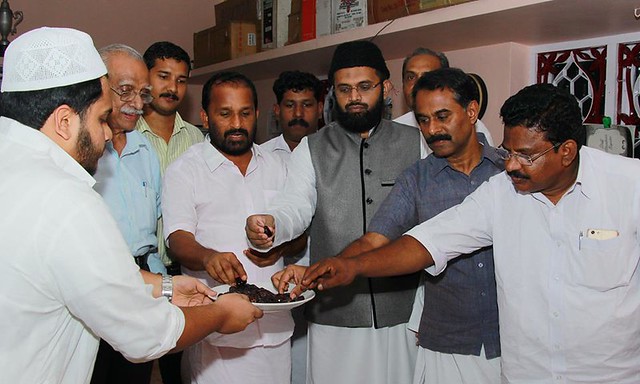By Shafeeq Hudawi
As children, we often do a number of things to fit in with our friends. For Congress leader and former MLA TN Prathapan, one such habit from his childhood days has continued throughout his adult life. Prathapan, a Hindu from Kerala, has been fasting every year during the month of Ramadan for the past 20 years.
The young Congress leader, who has twice represented Nattika in the state assembly, says the habit of fasting dates back to the 1980s when he was a school boy.
His Muslim friends–Ashraf Maliyekkal, Gafoor Thalikkulam and Babu Saleem–showed him ways of fasting. “My friends would not eat food or consume water during the days and I tried the same too,” he reminisces.
 TN Prathapan attending the Iftar meet at Palayam Juma Masjid in Thiruvananthapuram
TN Prathapan attending the Iftar meet at Palayam Juma Masjid in ThiruvananthapuramThe story of this friendship has since then become a familiar story of Hindu-Muslim harmony in Nattika. Prathapan has got accolades from the cultural and social leaders of Kerala by organising the annual social congregation at his constituency named Mythri, which literally means unity.
Prathapan’s fasting is all about attaining spiritual and physical purification rather than earning a good name of being an advocate of communal harmony. “Fasting lends me the joy and spiritual elevation, which words clearly fail to explain. It’s all about keeping my body and mind purified,” he says.
Prathapan suggests fasting as an ideal way to purification. “Fasting shouldn’t be conceived as a ritual of Muslims. Non-Muslims should try it. It makes man ready to overcome crisis,” he adds.
Asked about what is his Niyyah (intention of behind fasting) before having Sehri (predawn food) Prathapan says that his intention is the well being of the society.
“My fasting is a prayer for the well being of mine and the whole society,” he says.
An advocate of fasting in his speeches during Iftar parties, Prathapan has now turned into a columnist who describes Ramadan through newspapers and visual media. His works speak volumes about the spiritual virtues of fasting rather than turning Iftar into big social parties that have now become the norm. “Iftar parties have become venues of amorality and extravaganza. They should be exclusive for the persons those who are on fast and their sanctity should be respected as we do towards fasting,” he says.

